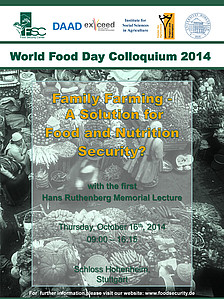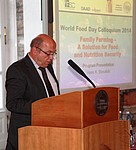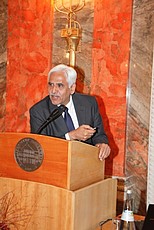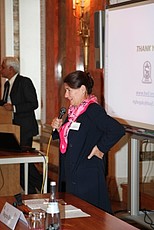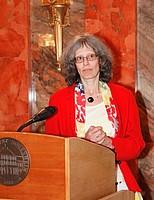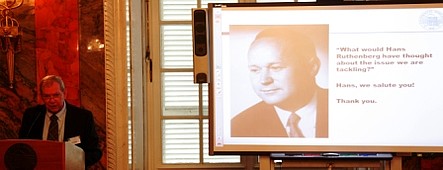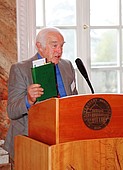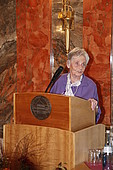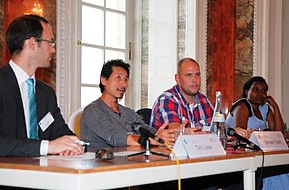World Food Day Colloquium 2014
Family Farming – A Solution for Food and Nutrition Security?
October 16th, 2014 | University of Hohenheim
On October 16th, 2014 approximately 140 scientists, students, consultants, and experts gathered for the World Food Day Colloquium 2014 at the University of Hohenheim. They reflected on the role of family farming and its significance for global food security. The colloquium also recognised the International Year of Family Farming coordinated by the UN. The Food Security Center (FSC), in close cooperation with the Institute for Social Science in Agriculture and the Center for Agriculture in the Tropics and Subtropics at the University of Hohenheim, organized the event. The latter also launched the first Hans Ruthenberg Memorial Lecture.
Introduction
There are over 500 million family farms spread across the world, which account for more than 56% of agricultural production. Family Farming is one key to feeding a global population, which will exceed nine billion people by 2050 - the invited speakers left no doubt about that. It’s a sad irony that today 50% of under nourished people are farmers and farm workers. Prof. Hans Biesalski, Director of the FSC, put it directly: “Poverty is the reason for hunger - especially for women and children. They represent 70% of the malnourished world-wide."
Poverty reduction
Narayan Hegde of BIAF, Development Research Foundation, Pune in India added: “Family farming is a must. Otherwise you don’t bring people out of poverty.” He explained that family farmers are the key for sustainable land use because they are emotionally linked to their land. “As long as they can earn their living, they want to conserve natural resources and to pass the land on to the next generation. With the perspective to inherit land, young people get involved easily. As soon as families can afford, they start to invest money: they send their children to school and they purchase livestock. Livestock leads to mixed farming, which generally reduces malnutrition. An increased level of education enables the youth to seek ways out of poverty. So in future farming will be increasingly combined with other forms of incomes, like market activity.” That means under feasible political and economic conditions family farming can be an economically, ecologically and socially sustainable way to cover future demands.
Need of sustainable strategies
And indeed “future strategies have to include the issues of sustainability and nutrient security,” reflected Regina Birner, professor at the Institute of Agricultural Economics and Social Sciences in the Tropics and Substropics and the managing director of the Center for Agriculture in the Tropics and Subtropics at the University of Hohenheim. “Especially in Asia, the green revolution was a success. The productivity of land was improved significantly and in parallel the productivity of labour increased. This worked well in cropping systems dominated by one or two crops (e.g. mono-cropping or crop rotation with two crops), but it failed completely in Africa and it neglected aspects of sustainability and nutrition security.” To meet future demands a revised and adapted approach is needed. And family farmers play an important role in this.
“Family Farming is a hard solution, but the only one we have”
Sister Vida C. Cordero pointed out that families are working under different conditions in terms of socioeconomic and natural environments (e.g. religions, cultures, societies, political systems, climate, soils, altitude, and exposition). “To satisfy future requirements we need diverse solutions. Is conventional research capable to create such a variety of solutions?” she questioned. As an experienced agricultural advisor in the Philippines she is convinced of the potential of the bottom up approach, such as farmer field schools or farmer field trails: “Farmer driven innovations generate tailored techniques and locally adapted answers.”
Entry points into productivity increase
The impact of projects and innovations differ distinctively. Some projects have huge potential to trigger changes throughout entire systems. The so-called “entry points” are interlinked with relevant variables and a change in those factors can lead to overall improvement. Hannah Jaenicke, consultant and main author of the FSC study on “nutrition sensitive agriculture” (see link to the right), specified projects that serve as entry points into a nutritious agricultural system. In this context she mentioned enabling policies such as the Zero Hunger Program in Brazil, awareness and capacity building projects in the Philippines, gender sensitive extension services in Malawi or applied analytics on collaboration mechanisms in Cambodia.
Make change happen
Applicable and effective solutions are only half the battle. “Without the appropriate financial and political framework, no substantial progress will be achieved,” reasoned Professor Jock Anderson, former Policy and Strategy Advisor of the World Bank, in the first Hans Ruthenberg Memorial Lecture. “Since Hans Ruthenberg passed away in the early 1980’s the population has doubled, while we faced an underinvestment in agricultural systems. So we did not succeed in eradicating hunger. In the future we need public funding, e.g. to improve health systems, education, infrastructure or for institutional reforms. But private investments are required as well to foster e.g. mechanisation, irrigation, or to define property rights. Private investments might even be critical to push the political will to make change happen. But whatever we do, we have to mind the future cost of agricultural production!”
In lively discussions the audience agreed on crucial requirements for productivity increases in family farming. These could be summarized essentially in a few words: Invest in research, extension and education! Diversify and intensify! Increase efficiency as well as profitability!
Link to the GIZ Study: "Nutrition Sensitive Agriculture"
The first Hans Ruthenberg Memorial Lecture
More than 40 years ago, in November 1971, Hans Ruthenberg, at that time a professor at the University of Hohenheim, published the first edition of "Farming systems in the tropics" and developed a functional and acceptable classification of various types of farms, farm households and their decision-making processes in tropical and subtropical agriculture. With his book he contributed significantly to the on-going systems research in agricultural development research.
Professor John MacArthur from Bradford University told some anecdotes about his friend and colleague, Hans Ruthenberg, and drew a lively portrait of the famous Hohenheim researcher. Professor Jock R. Anderson had professional contact with Hans Ruthenberg. He also took the opportunity to reflect on what Professor Ruthenberg taught and what he might have brought to the dialogue concerning the evolution of farming systems had he been able to continue the insightful work he had pursued up to his untimely departure on 1980. It was special to have Hans Ruthenberg’s widow and three of his children in the audience.
Perspectives from young scientists
PhD students of the FSC and the Center for Development (ZEF) in Bonn drew some interesting conclusions from their fieldwork. The chair, Tim Loos, postdoc at the FSC, moderated the panel.
Sonam Tashi, ZEF: Reflections on Bhutan
“Farms are becoming empty! Cheap imports are flooding the markets and the farmer has to cope with high labour costs and labour shortage. Therefore, the government brought up a new paradigm fostering modernised organic agriculture. The aim is to increase productivity and competitiveness of family farms and to promote rural development”.
Dorcus Gemenet, FSC: Perspectives of Sub-Sahara Africa
“Family farmers face a long list of challenges: like poor or imposed agricultural policies, increasing population, lack of public support and infrastructure, poor technical assistance, almost no access to credit and markets, minimal educational services, repressed gender issues for women and youth, and a generally low investment in agriculture."

